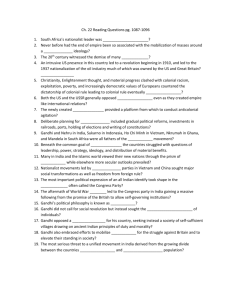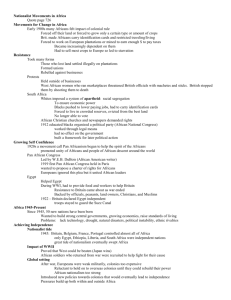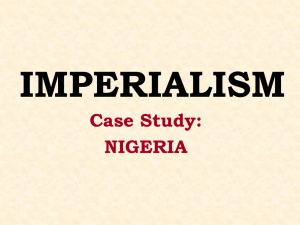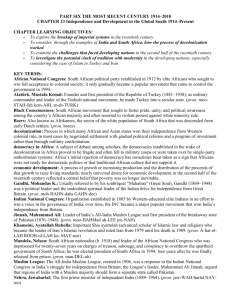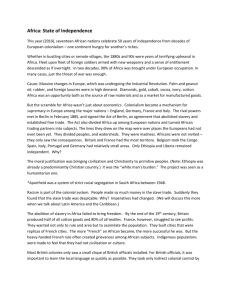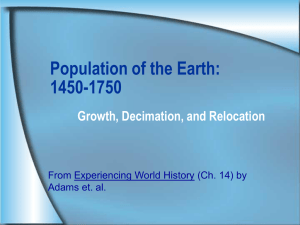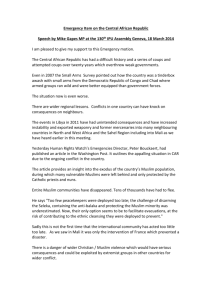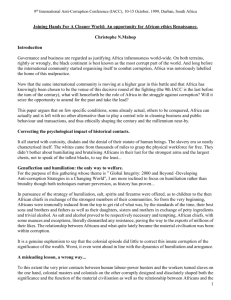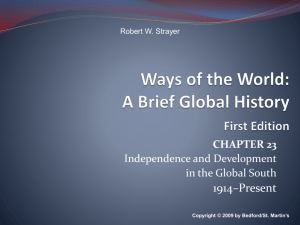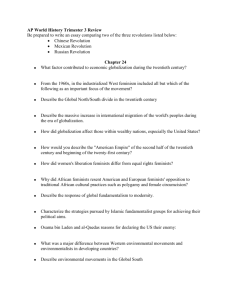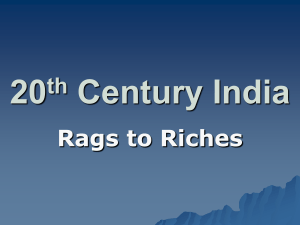Chapter 23 Outline: Decolonization & Independence
advertisement
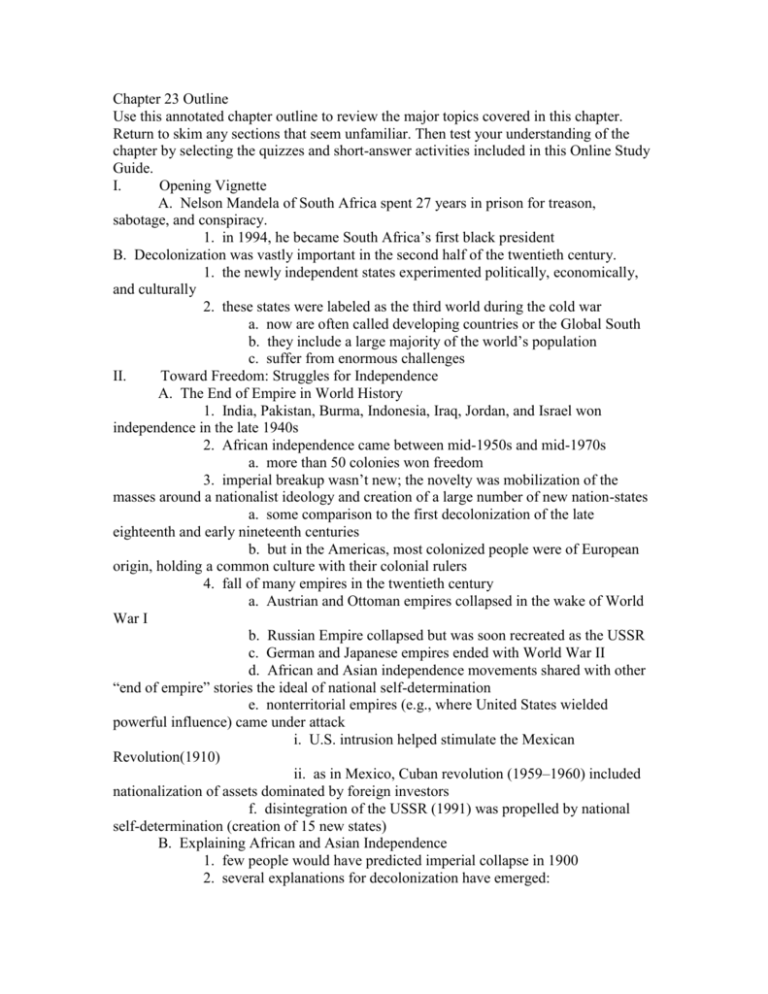
Chapter 23 Outline Use this annotated chapter outline to review the major topics covered in this chapter. Return to skim any sections that seem unfamiliar. Then test your understanding of the chapter by selecting the quizzes and short-answer activities included in this Online Study Guide. I. Opening Vignette A. Nelson Mandela of South Africa spent 27 years in prison for treason, sabotage, and conspiracy. 1. in 1994, he became South Africa’s first black president B. Decolonization was vastly important in the second half of the twentieth century. 1. the newly independent states experimented politically, economically, and culturally 2. these states were labeled as the third world during the cold war a. now are often called developing countries or the Global South b. they include a large majority of the world’s population c. suffer from enormous challenges II. Toward Freedom: Struggles for Independence A. The End of Empire in World History 1. India, Pakistan, Burma, Indonesia, Iraq, Jordan, and Israel won independence in the late 1940s 2. African independence came between mid-1950s and mid-1970s a. more than 50 colonies won freedom 3. imperial breakup wasn’t new; the novelty was mobilization of the masses around a nationalist ideology and creation of a large number of new nation-states a. some comparison to the first decolonization of the late eighteenth and early nineteenth centuries b. but in the Americas, most colonized people were of European origin, holding a common culture with their colonial rulers 4. fall of many empires in the twentieth century a. Austrian and Ottoman empires collapsed in the wake of World War I b. Russian Empire collapsed but was soon recreated as the USSR c. German and Japanese empires ended with World War II d. African and Asian independence movements shared with other “end of empire” stories the ideal of national self-determination e. nonterritorial empires (e.g., where United States wielded powerful influence) came under attack i. U.S. intrusion helped stimulate the Mexican Revolution(1910) ii. as in Mexico, Cuban revolution (1959–1960) included nationalization of assets dominated by foreign investors f. disintegration of the USSR (1991) was propelled by national self-determination (creation of 15 new states) B. Explaining African and Asian Independence 1. few people would have predicted imperial collapse in 1900 2. several explanations for decolonization have emerged: a. emphasis on the fundamental contradictions in the colonial enterprise i. rhetoric of Christianity and material progress didn’t fit the reality of racism, exploitation, and poverty ii. Europeans’ increasingly democratic values were in conflict with colonial dictatorship iii. ideal of national self-determination was at odds with repression of the same in colonies b. historians use the idea of “conjuncture” to explain timing of decolonization i. the world wars had weakened Europe and undermined a sense of European superiority ii. the United States and USSR opposed older European colonial empires iii. the UN provided a platform for anticolonial moves iv. these factors helped create a moral climate in which imperialism was viewed as wrong v. by the early to mid-twentieth century, the colonies had multiple generations of Western-educated elites c. some scholars emphasize the role of specific groups and individuals—the issue of “agency” i. in many areas, colonial powers themselves planned for independence of colonies ii. pressure of nationalist movements iii. the leaders of some nationalist movements became the “fathers” of new states: Gandhi and Nehru (India), Sukarno (Indonesia), Ho Chi Minh (Vietnam), Nkrumah (Ghana), Mandela (South Africa) iv. millions of ordinary people joined in 3. independence was contested everywhere a. independence efforts usually were not cohesive movements of uniformly oppressed people b. fragile coalitions of conflicting groups and parties III. Comparing Freedom Struggles A. The Case of India: Ending British Rule 1. before 1900, few people of the Indian subcontinent thought of themselves as “Indians” a. cultural identity was primarily local b. diversity was enormous 2. British rule promoted a growing sense of Indian identity a. unlike earlier foreign rulers, the British didn’t assimilate; Indians shared more similarities to each other than to the rulers b. British communications and administrative networks, schools, and use of English bound India together 3. 1885: establishment of the Indian National Congress (INC) a. almost exclusively an association of English-educated, highcaste Hindus b. made moderate demands; at first asked for a greater role in the life of British India c. British mocked them and rejected their claim to speak for all Indians d. the INC only began to gain a wide following after World War I i. in 1917, Britain promised future development of selfgovernment ii. British attacks on the Ottoman Empire antagonized Muslim Indians iii. repressive actions by the British caused outrage 4. the role of Mohandas Gandhi (1869–1948) a. had studied law in England but wasn’t a very successful lawyer b. in 1893, took a job in South Africa i. joined a movement to fight racial segregation there ii. developed a notion of India that included both Hindus and Muslims c. developed the political philosophy of satyagraha (“truth force”) i. active but nonviolent confrontation d. back in India, Gandhi became a leader of the INC i. 1920s and 1930s: periodic mass campaigns that won massive public support ii. British responded with repression and concessions iii. Gandhi transformed the INC into a mass organization iv. won the name “Mahatma” (Great Soul) e. attacked not just colonial rule but also mistreatment of India’s untouchables and the evils of modernization 5. not everyone agreed with Gandhi a. especially important was a growing Muslim/Hindu divide b. 1906: creation of an All-India Muslim League c. some Hindu politicians defined the nationalist struggle in religious terms d. Muhammad Ali Jinnah, head of the Muslim League, argued that regions of India with a Muslim majority should be a separate state (Pakistan, the land of the pure) 6. independence in 1947 created two countries a. Pakistan (Muslim, divided into two wings 1,000 miles apart) b. India (secular but mostly Hindu) c. process was accompanied by massive violence; some 1 million died, 12 million refugees relocated 7. 1948: a Hindu extremist assassinated Gandhi B. The Case of South Africa: Ending Apartheid 1. South Africa won freedom from Great Britain in 1910 2. but its government was controlled by a white settler minority a. so the black South African freedom struggle was against an internal opponent 3. white population was split between British descendants (had economic superiority) and Afrikaners (Boers) of Dutch descent (had political dominance) a. Afrikaners had failed to win independence from the British in the Boer War (1899–1902) b. both white groups felt threatened by any move toward black majority rule 4. by the early 1900s, South Africa had a mature industrial economy a. by the 1960s, had major foreign investments and loans b. black South Africans were extremely dependent on the whitecontrolled economy c. the issue of race was overwhelmingly prominent i. policy of apartheid tried to keep blacks and white completely separate, while retaining black labor power ii. enormous repressive powers enforced social segregation 5. African National Congress (ANC) founded in 1912 a. like India’s INC, it consisted of elite Africans who wanted a voice in society b. for 40 years, the ANC was peaceful and moderate c. 1950s: moved to nonviolent civil disobedience d. the government’s response was overwhelming repression i. 69 unarmed demonstrators were shot at Sharpville in 1960 ii. ANC was banned and its leadership imprisoned 6. underground nationalist leaders turned to sabotage and assassination a. opposition came to focus on student groups b. Soweto uprising (1976) was the start of spreading violence c. organization of strikes 7. growing international pressure a. exclusion from international sporting events b. economic boycotts c. withdrawal of private investment funds 8. negotiations began in the late 1980s a. key apartheid policies were abandoned b. Mandela was freed and the ANC legalized 9. 1994: national elections brought the ANC to power a. apartheid was ended without major bloodshed b. most important threat was a number of separatist and “Africans only” groups IV. Experiments with Freedom A. New nations emerging from colonial rule confronted the problem of how to parlay independence into economic development and industrial growth,unification, and political participation. 1. already independent but nonindustrialized countries faced the same quest for a better life 2. all together = the third world (developing countries, the Global South) 3. 1950–2000: developing nations contained 75 percent of world population a. accounted for almost all of the quadrupling of world population in the twentieth century 4. independence created euphoria, but optimism soon faded in light of difficulties B. Experiments in Political Order: Comparing African Nations and India 1. common conditions confronted all efforts to establish political order: a. explosive population growth b. overly high expectations for independence c. cultural diversity, with little loyalty to a central state 2. in the 1950s, British, French, and Belgians set up democratic institutions in their African colonies a. few still survived by the early 1970s b. many were swept away by military coups c. some evolved into one-party systems 3. in India, Western-style democracy succeeded a. the independence movement was more extended, and power was handed over gradually b. many more Indians than Africans had administrative and technical skills at the time of independence c. the Indian Congress Party embodied the whole nationalist movement, without too much internal discord 4. various arguments as to why Africans initially rejected democracy a. some argue that the Africans were not ready for democracy or lacked some necessary element b. some argue that African traditional culture (communal,based on consensus) was not compatible with party politics c. some argue that Western-style democracy was inadequate to the task of development 5. widespread economic disappointment discredited early African democracies a. African economic performance since independence has been poor b. widespread economic hardship c. modern governments staked their popularity on economic success 6. the well-educated elite benefited most, obtaining high-paying bureaucratic jobs that caused resentment 7. economic resentment found expression in ethnic conflict 8. repeatedly, the military took power in a crisis 9. starting in the 1980s, Western-style democracy has resurfaced a. series of grassroots movements arose after authoritarian governments failed to improve economic situation C. Experiments in Economic Development: Changing Priorities, Varying Outcomes 1. the belief that poverty isn’t inevitable won out a. however, in many states, colonial rule had not provided much infrastructure for modern development b. most developing countries didn’t have leverage in negotiation with wealthy nations and corporations c. African leaders got contradictory advice on how to develop successfully 2. general expectation in the developing world that the state would spur economic development a. most private economies were weakly developed b. Chinese and Soviet industrialization provided models c. but for several decades, there has been growing dependence on market forces for economic development i. many states privatized state-run industries ii. influenced by collapse of the USSR’s state-dominated economy iii. Western pressures pushed developing countries toward capitalism 3. urban vs. rural development has been an important issue a. in some areas, the “urban bias” has been partly corrected b. women’s access to employment, education, and birth control provided incentives to limit family size 4. debate over whether foreign aid, investment, and trade are good or bad 5. the degree of economic development has varied widely by region a. East Asia has been the most successful b. 1990s: India opened itself more fully to the world market c. several Latin American states developed industrially d. most of Africa, much of the Arab world, and parts of Asia didn’t catch up, and standards of living often declined e. there is no general agreement about why such great variations developed D. Experiments with Culture: The Role of Islam in Turkey and Iran 1. the relationship between Western-style modernity and tradition has been an issue across the developing world 2. the case of Islam: Turkey and Iran approached the issue of how Islam and modernity should relate to each other very differently 3. Turkey: emerged in the wake of World War I, led by Mustafa Kemal Atatürk (1881–1938) a. major cultural revolution in the 1920s and 1930s b. effort to create a thoroughly modern, Western society c. much of the Islamic underpinning of society was abolished or put under firm government control i. effort to keep Islam personal, rather than an official part of public life d. men were ordered not to wear the fez; many elite women gave up the veil e. women gained legal rights, polygamy was abolished, and women got the vote (1930s) f. state-organized enterprises were set up g. government remained authoritarian, although a parliamentary system emerged after 1938 4. Iran: became the center of Islamic revival (1970s) a. growing opposition to Shah Muhammad Reza Pahlavi’s modernizing, secularizing, U.S.-supported government b. many of the shah’s reforms offended traditional Islamic practices c. the mosque became the main center of opposition to the government i. the Shia ulama had stayed independent from the state ii. Shia leaders became the voice of opposition, especially the Ayatollah Khomeini d. the shah was forced to abdicate in 1979, and Khomeini assumed control of the state i. established the sharia as the law of the land ii. secular officials were purged iii. rejection of many Western practices as anti-Islamic e. the Islamic revolution in Iran wasn’t revolutionary in social terms i. Iran also continued to work on economic modernity V. Reflections: History in the Middle of the Stream A. It is difficult for historians to discuss more recent events and themes like those described in this chapter, because that history is still in the making. 1. detachment is difficult 2. we don’t know what the final outcomes will be B. Historians know how unexpected and surprising historical processes can be. 1. but still, history is our only guide to the possible shape of the future 2. the history of modern events provides a useful reminder that people in earlier times didn’t know the way things would turn out either
